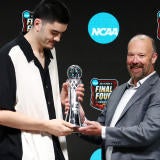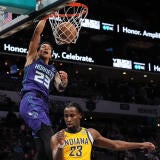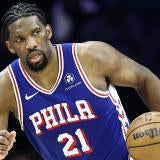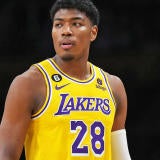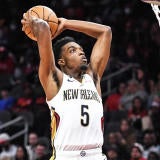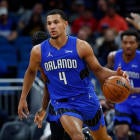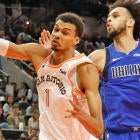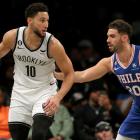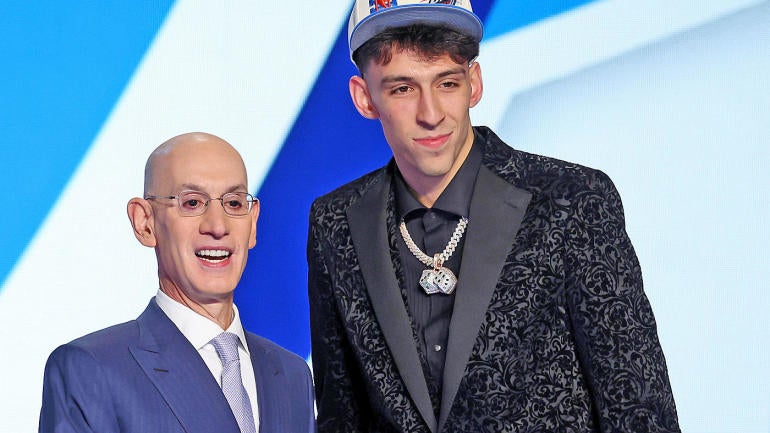
In season-long Fantasy Basketball leagues, targeting rookies tends to be a rather volatile, hit-or-miss proposition. While some rookies hit the ground running and emerge as top-50 values, others struggle to round out their stat profiles and require more time to settle in.
Last season, the loaded 2021 rookie class was led by Scottie Barnes, Cade Cunningham, Evan Mobley and Franz Wagner – all of whom finished inside the top-65 in eight-category total value. This year's class is similarly buoyed by star power at the top, but it's packed with plenty of depth and potential instant-impact players all the way through the late-lottery.
The first three picks in the draft – Paolo Banchero (Magic), Chet Holmgren (Thunder) and Jabari Smith (Rockets) – will all be well-positioned for major roles from the jump, while in Detroit fifth overall pick Jaden Ivey will team with Cade Cunningham to form perhaps the league's most exciting young backcourt. Meanwhile, No. 4 pick Keegan Murray will compete for a starting spot in Sacramento, as will 10th pick Johnny Davis in Washington and 15th pick Mark Williams in Charlotte.
While this year's crop of rookies have only been a part of their new teams for less than a week, it's never too early to start evaluating which players will make for the best Fantasy targets. With free agency and summer league just around the corner, here are the top 10 rookies to consider drafting in 2022-23 Fantasy Basketball leagues:
Jabari Smith, Rockets
Widely considered the favorite to go No. 1 to Orlando, Smith slipping to Houston at No. 3 was arguably the biggest surprise of the night. Despite the brief slide, Smith wound up in perhaps an even better Fantasy situation as part of a Houston roster still very much in need of help at both ends.
There's a strong case to be made that Smith is the most NBA-ready of the top prospects in the class, so he should walk right into the starting power forward spot, likely alongside 2021 first-rounder Alperen Sengun. There's no doubt that Jalen Green will hold the reins of the Rockets' attack, but Smith should be in position to contribute as a scorer, rebounder and defender.
As a freshman at Auburn, Smith averaged a well-rounded 16.9 points, 7.4 rebounds, 2.0 assists, 1.1 steals and 1.0 blocks per game. His overall field goal percentage was nothing special (42.9% FG), but he shot 42 percent from downtown on high volume (5.5 3PA/G). Smith may not have the highest ceiling in the 2022 class, but he's the safest bet to return value in standard leagues. Whether or not the defensive numbers translate will ultimately determine his ceiling.
Paolo Banchero, Magic
Banchero's rapid ascent from presumed third pick to No. 1 overall selection sent mock drafts and sports bettors into a frenzy on draft night. Ultimately, he landed in a great spot with the Magic, though Orlando has a few more mouths to feed than the team – the Houston Rockets – everyone thought Banchero would end up with.
Two lottery picks from last season – Franz Wagner and Jalen Suggs – return, while Cole Anthony, Markelle Fultz, Jonathan Isaac and Chuma Okeke have all displayed varying degrees of long-term potential. Then there's the center position, currently home to both Wendell Carter and Mo Bamba. The arrival of Banchero likely means Bamba could be sent packing, but even so this won't be a situation where Banchero is simply handed the keys to the franchise. He'll have to compete with Anthony, Suggs, Wagner and Carter for touches as a rookie.
With all of that said, Banchero is the most talented of the group, and he has the best chance to develop into a superstar, so his development shoots to the top of the Magic's list of priorities. With Orlando likely to struggle again this season, Banchero should have a long leash to play through the typical NBA rookie growing pains.
Once he settles in, Banchero should be a solid source of points, rebounds and assists for his position. It's unclear how much of a defensive impact he'll make, however, and he still has to make progress in terms of 3-point (33.8% last season) and free throw (72.9% FT) efficiency.
Keegan Murray, Kings
Just when it seemed like they would pull the trigger on another guard with a high-lottery pick, the Kings made the mildly surprising call to select Murray over Jaden Ivey. Rarely do teams draft for need in the top five, but the Kings are desperate for help up front, and Murray fits the profile of a plug-and-play power forward.
One of the most productive players in the country last season, it will be interesting to note just how smoothly Murray transitions to the next level. Statistically, there are very few holes to poke in his resume, but Murray was not a top recruit, and Iowa is not exactly an NBA factory, so – fair or not – he'll be met with some degree of skepticism.
Fantasy-wise, the appeal with Murray is his combination of efficient scoring (23.5 PPG, 55.4% FG last season), high-level 3-point shooting (39.8% 3Pt) and impressive defensive numbers (3.2 blocks/steals per game). Like Jabari Smith, Murray is not a great passer or playmaker, but he does the little things well and should have a relatively high floor.
If there's a concern, it's that Sacramento has a pair of high-usage players in De'Aaron Fox and Domantas Sabonis, as well as a high-minute veteran in Harrison Barnes who could cut into Murray's workload. But unless the Kings make some sort of splash this offseason, Murray will be positioned for significant minutes whether he's ready or not.
Chet Holmgren, Thunder
In Dynasty formats, I would rank Holmgren as easily my No. 1 Fantasy player in the class. He has the highest real-life ceiling and the highest Fantasy ceiling if things break right. In two or three years, it's conceivable that he could have an Anthony Davis-like Fantasy profile with better 3-point shooting. Early on, though, Holmgren and his 7-foot, 200-pound frame could face a rough adjustment period.
That's not to say Holmgren won't be productive in Year 1. He's in a great spot with the Thunder and will likely start every game in which he plays. But the physicality of the NBA is going to be a problem, and as was often the case at Gonzaga, Holmgren will likely be prone to frequent foul trouble. In many ways, I look at Holmgren as a souped-up version of Alperen Sengun last season. On a per-minute basis, he could be a Fantasy machine. But will he play enough minutes, and will his body hold up, to justify a top-70 Fantasy selection?
Setting aside the physical concerns, the Thunder are also notoriously careful with their young assets. Holmgren should have plenty of leash to play through bad stretches, but as the 2023 NBA Draft approaches, it wouldn't be a surprise if OKC makes one more grand tanking effort. Holmgren is not the type of prospect the Thunder should mess around with, but it's worth considering that Josh Giddey played in game after the All-Star break last season.
Mark Williams, Hornets
No one is claiming Williams is the fifth-most-talented player in the class, but his landing spot in Charlotte could translate to immediate Fantasy value. Charlotte passed on Jalen Duren to go with the safer and more experienced option in Williams, who was one of the best rim-runners and shot-blockers in the nation last season.
It's time for the Hornets to admit defeat on the Mason Plumlee acquisition, and they'll likely do everything they can to move his expiring deal this offseason. Whether that ultimately happens or not, Williams would represent an immediate upgrade for a team that's struggled to find any level of consistent center play for nearly a decade.
Numbers-wise, Williams' counting stats likely won't be overly remarkable, but he could be a 1.5-blocks-per-game guy right away who rebounds and subsists almost exclusively on dunks and layups on offense. Williams also shot nearly 73 percent at the free throw line last season – above average for bigs with his physical profile. Reliable shot-blocking is always tough to find in Fantasy, so targeting Williams late in drafts should be a priority.
Jaden Ivey, Pistons
The first guard off the board at No. 5, Ivey will team up with Cade Cunningham to form the most entertaining young backcourt in the league. Ivey is an excellent fit in Detroit and should be given every opportunity to earn a high-minute role on a developing team from Day 1.
Ivey is an electrifying player who people are understandably going to want to draft, but there's some major boom-or-bust potential here – especially in Year 1. Like most rookie guards, Ivey could struggle to post efficient percentages, which might hinder his value in category leagues. Ivey shot just 73.9 percent at the line in two college seasons, and while his 3-point shooting improved as a sophomore (35.8% 3Pt), it's still a major question mark in his stat profile.
Ultimately, Ivey is a fun prospect who could very well break out as a rookie and return top-75 value alongside Cunningham. However, there's also a path to him struggling to adapt and looking like this year's version of Jalen Suggs. Realistically, Ivey's rookie year could look a lot like De'Aaron Fox's in 2017-18. Fox had plenty of encouraging moments and was by no means a bust, but ultimately he finished outside the top 170 in 8-cat Fantasy leagues.
Benedict Mathurin, Pacers
On paper, Mathurin landed in a tricky spot with the Pacers, who currently have Malcolm Brogdon, Tyrese Haliburton, Chris Duarte and Buddy Hield on the roster. But the selection of the reigning Pac 12 Player of the Year at No. 6 only adds more credence to the notion that Indiana will make a spirited effort to move Brogdon – and perhaps Hield or Duarte – this summer.
Assuming that happens, the door could be open for Mathurin to start at shooting guard while Haliburton occupies the point guard spot. At 6-foot-7, Mathurin has prototypical size for the position and should be able to hit the ground running as a slasher and shooter (38.3% 3PT in two seasons at Arizona). He's a good rebounder (5.6 RPG) and decent passer (2.5 APG), but the hope is that his physical abilities can translate to better defensive numbers at the NBA level.
Ultimately, if the Pacers turn the keys over to Haliburton and Mathurin, he should be in position to play enough minutes to maintain Fantasy relevancy, even if the shooting efficiency lags behind a bit.
Johnny Davis, Wizards
Davis landing in Washington began to look like more and more of a certainty in the days leading up to the draft, and the Wizards ultimately got their man at No. 10. Assuming Bradley Beal returns, Davis won't exactly walk into the most Fantasy-friendly situation. But after taking a quick glance at Washington's depth chart, there's a good chance the Wisconsin product will open the season starting next to Beal in the backcourt.
He'll still fall in line behind Kristaps Porzingis and Kyle Kuzma, but the Wizards are somewhat of a rudderless ship, so the team context will be subject to change at a moment's notice. In terms of his stat profile, Davis is a capable scorer (19.7 PPG last season) who rebounds extremely well (8.2 RPG) for his size and position.
Those categories will be his calling cards early on, as it's not clear how much of an impact he'll have as a passer (2.1 APG), defender (1.2 SPG, 0.7 BPG) or 3-point shooter (30.6% 3PT; 3.9 3PA/G). Overall, though, Davis landed in a great spot for him to see meaningful minutes right away.
Jalen Duren, Pistons
The Pistons moved back into the late-lottery to pair Duren with Ivey, so they clearly have a high grade on the big man out of Memphis. With that said, Isaiah Stewart is still in place, so is Kelly Olynyk, and the Pistons reportedly plan to bring back Marvin Bagley in free agency this summer. So while Duren has all the makings of Detroit's center of the future, it's a bit unclear just how sizable his role will be in Year 1.
Those concerns aside, Duren is an ultra-impressive athlete whose skill set should translate well to the NBA game. He racked up 12.0 points, 8.1 rebounds (3.0 OREB/G) and 2.1 blocks in just 25.3 minutes per game last season, so even if he sees limited action behind Stewart and Olynyk, it's possible that the blocks, rebounds and field goal percentage could keep him relevant in deeper Fantasy leagues. In Dynasty formats, Duren is a very appealing target.
Shaedon Sharpe, Trail Blazers
This final spot could go to a number of players, but just like the Blazers on draft night, it's hard to ignore Sharpe's offensive upside. One of the most high-variance prospects in recent memory, Sharpe has legitimate superstar potential, but it feels almost equally likely that he could be the next Emmanuel Mudiay.
With the Trail Blazers' roster very much in flux as they re-tool around Damian Lillard, it's too early to project exactly what Sharpe's role will be as a rookie. Right now, he figures to slot in behind Lillard and Anfernee Simons, but Portland could very well add more veteran depth between now and October. Either way, Sharpe has big-time upside as a scorer and 3-point threat, so while he may not be worth drafting in most leagues, he's a name to earmark on the waiver wire.
Other rookies to monitor
Ousmane Dieng and Jalen Williams, Thunder: OKC made back-to-back picks at 11 and 12, landing Dieng and Williams to pair with Chet Holmgren. Holmgren will obviously be a fixture as a rookie, but the Thunder have so many random young players on the roster that it's difficult to assess how much of a role Dieng and Williams will have. Both players have excellent length and unique skill sets, so it's possible at least one of the pair could push Darius Bazley for serious minutes at one forward spot. As a three-year college player, Williams is the more appealing Fantasy option for 2022-23.
Tari Eason, Rockets: The Cincinnati transfer put up big numbers as a sophomore at LSU, including 3.0 blocks/steals per game. He landed in perhaps the most Fantasy-friendly situation in the league in Houston, where he'll have an excellent opportunity to push for regular minutes off the bench behind Jabari Smith and Jae'Sean Tate.
Walker Kessler, Timberwolves: It's rare for a team to fill a need in the 20s, but Kessler steps in as a much-needed backup center for a team that got away with using Naz Reid in that role last season. Reid is a fine player, but Kessler is a better fit, physically, and his shot-blocking upside could keep him relevant in deeper – or even standards – Fantasy leagues. Kessler swatted 4.6 shots per game in just 25.6 minutes last season at Auburn.
Dyson Daniels, Pelicans: Daniels landed in a perfect spot with the Pelicans at No. 8, but he's more of a long-term consideration when it comes to Fantasy. The Pels already have CJ McCollum and Brandon Ingram locked in, while Herbert Jones and Jose Alvarado are in place as defensive-minded players. The G League Ignite product could play a small role as a rookie, but he likely won't do enough to warrant Fantasy consideration.
Jeremy Sochan, Spurs: Another player who landed in a great developmental spot, Sochan is a classic Spurs pick who brings tremendous upside on the defensive end. Both in the short- and long-term, Sochan projects to have a bigger real-life impact than Fantasy, but down the road he could be a good source of rebounds and defensive production. Sochan has the foundation of a decent 3-point shot, but it's very much a work in progress at this stage.
Ochai Agbaji, Cavaliers: The rare college-senior-turned-lottery-pick, Agbaji fills a need for the Cavs, who struggled to find wing scoring – especially off the bench – last season. Agbaji will probably be an upgrade over Cedi Osman right away, and he'll jockey for minutes behind Caris LeVert and Isaac Okoro, who showed mild improvement in his second NBA season.
Griffin slipped a bit lower than some expected, but he should have a chance to carve out a bench role in Atlanta. At the college level, Griffin was a knockdown 3-point shooter. If that translates, he could have some value as a points/3s specialist.







